10 Dog Cold Symptoms Every Pet Owner Should Recognize
Overview
This article highlights the importance of recognizing ten key cold symptoms in dogs that every pet owner should be aware of. We understand how concerning it can be when your furry family members show signs of discomfort. Symptoms such as:
- Coughing
- Sneezing
- Lethargy
- Loss of appetite
can indicate underlying health issues, and it’s crucial to detect these signs promptly. By being proactive in monitoring your pet’s health, you can ensure their well-being and happiness.
At Adventure Den, we emphasize the necessity of seeking veterinary care when these symptoms arise. Our compassionate team is dedicated to providing a nurturing environment for your pets, ensuring they receive the best care possible. Remember, your pet relies on you to recognize these signs and act swiftly.
We encourage you to stay vigilant and attentive to your dog’s health. By doing so, you not only protect their well-being but also foster a deeper bond with your beloved companion. Let’s work together to keep your furry family member healthy and happy.
Introduction
Recognizing when your beloved dog is feeling under the weather can be challenging for any pet owner. Symptoms like coughing, sneezing, and lethargy often mirror common human ailments, making the signs of a canine cold easy to overlook. This article delves into the essential symptoms every dog owner should be aware of, providing valuable insights that can lead to timely interventions and better health outcomes for your furry family members.
What happens when these seemingly benign signs escalate? Understanding the nuances of dog cold symptoms could be the key to ensuring a swift recovery and maintaining the joy in your pet’s life.
Adventure Den: Personalized Care for Dogs with Cold Symptoms
At Adventure Den, we understand that the well-being of your furry family members is your top priority, especially when they show signs of illness. Our dedicated team of pet care experts is trained to identify and respond to the unique needs of canines feeling unwell. With personalized care plans, we ensure that each dog receives the attention and comfort they need to aid in their recovery.
Our expansive play areas and engaging activities are thoughtfully tailored to accommodate their condition, allowing them to enjoy a nurturing environment while recuperating. Recognizing dog cold symptoms in canines is crucial, as prompt detection can greatly influence their health outcomes. Symptoms such as:
- Coughing
- Sneezing
- Lethargy
are examples of dog cold symptoms that should prompt immediate attention. Our vigilant staff is always monitoring for these signs, ensuring your pet is well cared for.
As veterinarians emphasize, being proactive in recognizing these symptoms can lead to timely veterinary care, which is essential for a swift recovery. At Adventure Den, we are committed to providing a secure and nurturing environment for all canines, ensuring they receive the care necessary to feel better and return to their playful selves. Your pet deserves the best, and we are here to provide just that.
Coughing: A Key Indicator of Dog Cold Symptoms
Coughing in dogs can vary significantly, ranging from a mild, intermittent cough to a persistent, distressing one. This symptom often indicates irritation in the throat or respiratory tract, potentially signaling dog cold symptoms or other respiratory conditions. As a caring pet owner, it’s essential to closely monitor the frequency and intensity of your dog’s cough. An increase in severity may necessitate veterinary attention. Context is crucial; for instance, a cough that occurs during play may differ in significance from one that arises at rest.
At Adventure Den, our dedicated personnel are trained to monitor and record any coughing incidents, ensuring that any changes in a dog’s condition are swiftly managed. This proactive approach helps in identifying potential respiratory infections early, allowing for timely intervention. Dogs in shelters or boarding facilities are particularly susceptible to kennel cough, making vigilant observation essential for their well-being.
Veterinary insights highlight the importance of recognizing coughing as a frequent sign of dog cold symptoms in canine respiratory infections, such as kennel cough, which impacts millions of dogs each year. With over 5 million cases reported in the U.S. alone, acknowledging coughing as a key indicator can aid in early diagnosis and treatment, ultimately enhancing the health and well-being of your furry family members. Additionally, more than half of kennel cough outbreaks arise from day-to-day contact between dogs, emphasizing the transmission risks in daycare environments.
To protect your beloved pets, annual vaccination is advised to prevent kennel cough, offering a significant preventive measure for pet caregivers. Most cases of kennel cough do not require antibiotics, which can reassure owners concerned about treatment options. Infected canines should be isolated for 14 days after signs resolve, as they can remain contagious for up to three weeks. This highlights the need for careful observation in communal environments, ensuring a nurturing atmosphere for all pets.
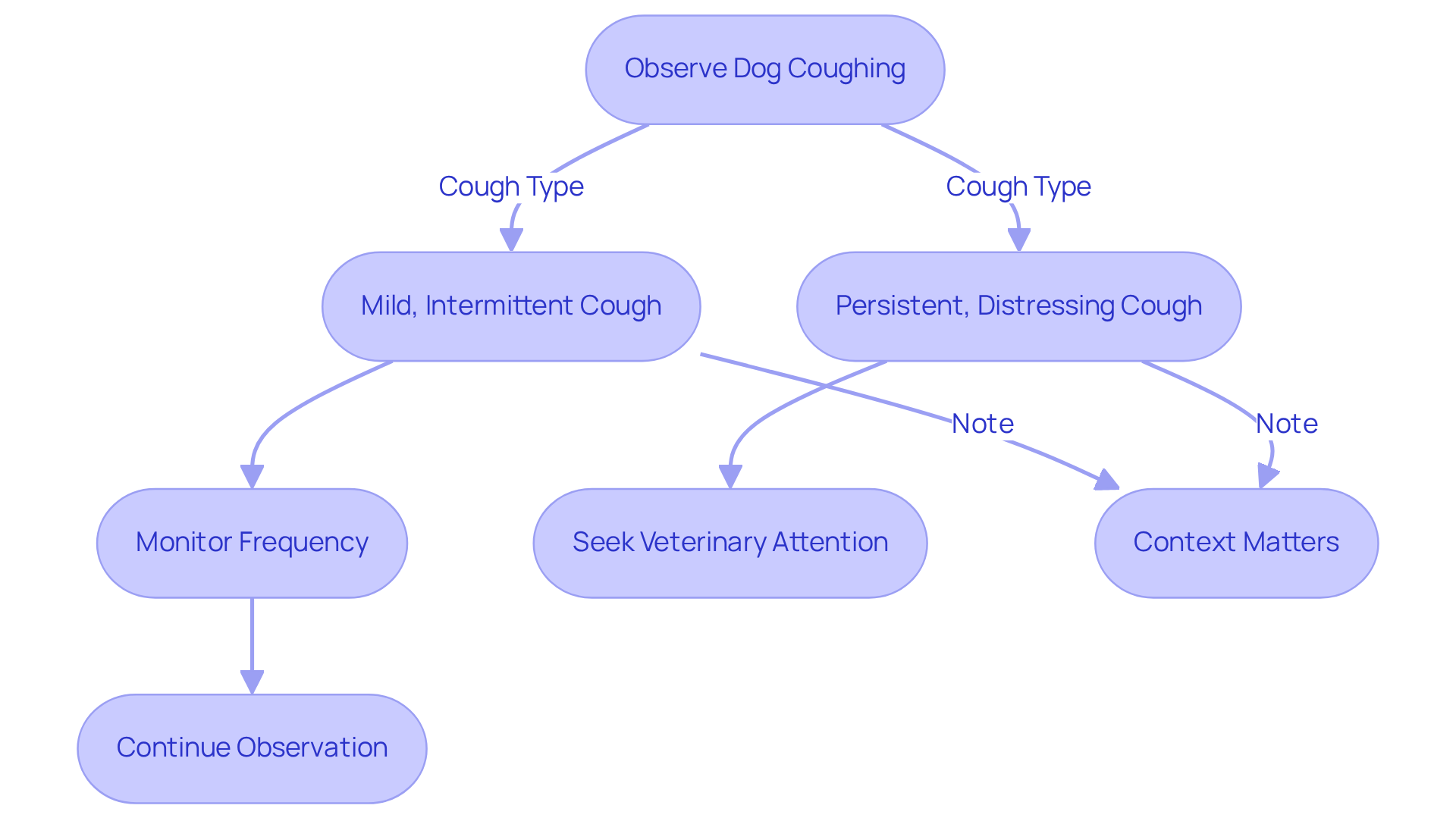
Runny Nose: Recognizing Nasal Discharge in Dogs
A runny nose in your furry family members can manifest as clear, watery discharge or thicker, colored mucus. While a mild runny nose may not be a cause for concern, it’s important to pay attention to persistent or discolored discharge, as it can indicate a more serious issue. As loving pet owners, you should monitor your dog’s behavior and overall well-being. A runny nose often occurs alongside other signs, such as coughing or sneezing, which may suggest dog cold symptoms or a respiratory infection.
At Adventure Den, we understand how concerning it can be when your pet isn’t feeling their best. By staying vigilant and observing any accompanying symptoms, you can ensure that your beloved companion receives the care they need. Remember, your attention to these signs can make a significant difference in their health and happiness. If you notice any troubling symptoms, don’t hesitate to reach out to us for support. We’re here to help you create a nurturing environment for your pets.
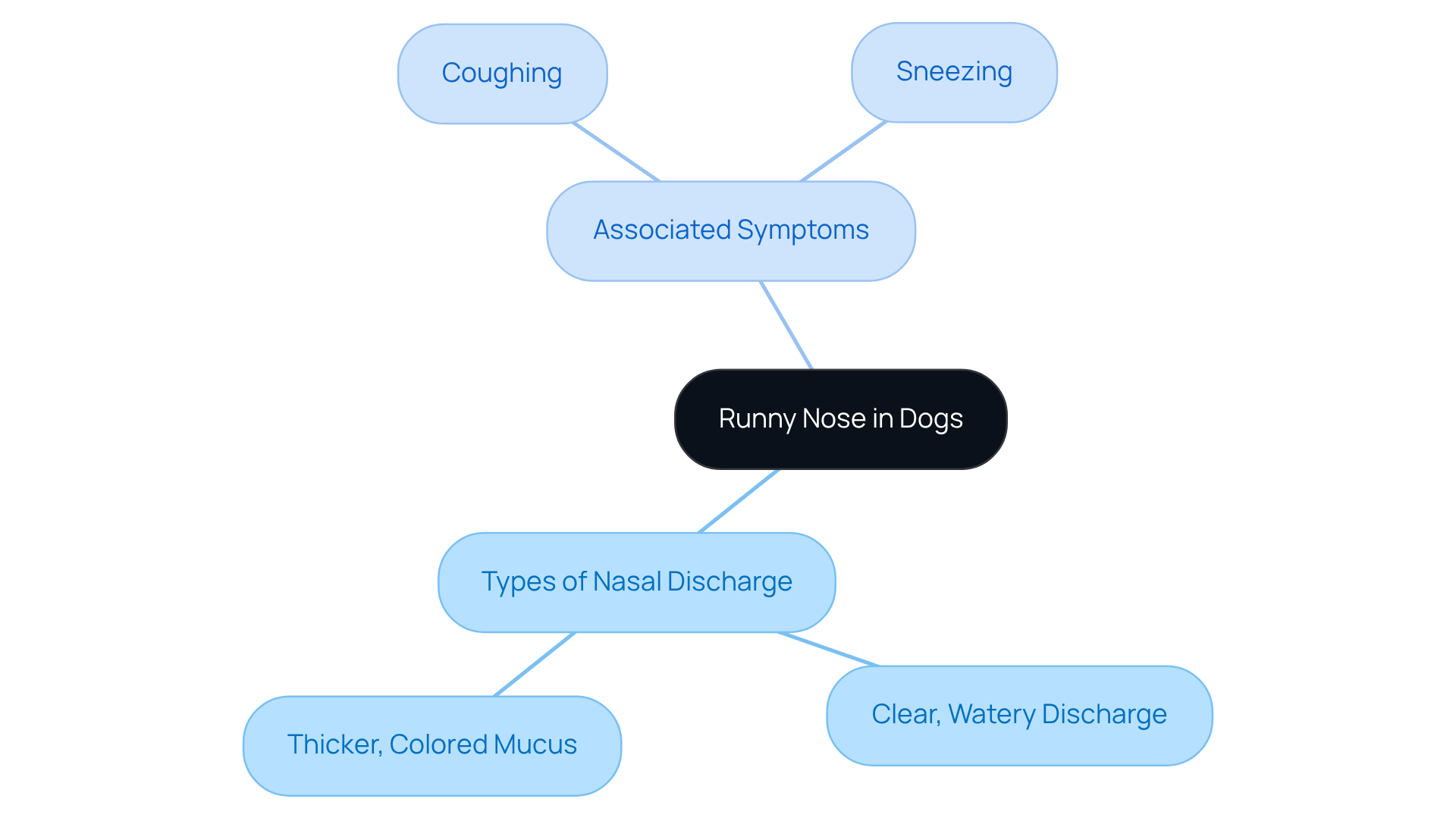
Lethargy: Understanding Your Dog’s Energy Levels
Lethargy in dogs is a significant symptom that can raise concerns, especially when your typically energetic furry family member appears unusually tired or disinterested in their favorite activities. This decrease in energy may indicate underlying health issues, such as dog cold symptoms or other illnesses. It’s essential for pet guardians to closely observe their dog’s activity levels and identify any changes from their usual behavior. If your dog shows persistent lethargy, particularly if it lasts more than 24 hours, it’s important to visit the veterinarian for a thorough evaluation. As Dr. Amy Attas wisely notes, “Lethargy does indicate that something is making your dog feel unwell and it’s a good time to contact your veterinarian.”
Veterinary insights emphasize the importance of understanding changes in your dog’s energy levels, as lethargy can be a nonspecific sign indicating that something is affecting their normal behavior. In fact, studies indicate that lethargy represents nearly half (47.79%) of documented clinical signs in canines presenting to veterinary clinics. This highlights the need for pet owners to be vigilant and proactive in observing their beloved pets.
Canine daycare centers, like Adventure Den, play a crucial role in monitoring energy levels among pets. With dedicated staff trained to recognize behavioral changes, these facilities provide a nurturing environment where any signs of lethargy can be promptly addressed. By ensuring that dogs engage in regular play and socialization, daycare facilities help maintain their physical and mental well-being, making it easier to spot any concerning changes in energy levels.
Understanding why your dog may be lethargic is essential. Factors such as illness, stress, or even environmental changes can contribute to a decrease in energy. If your dog exhibits lethargy along with other dog cold symptoms, like vomiting or diarrhea, it is crucial to seek veterinary advice. By being attentive to your dog’s behavior and energy levels, you can ensure their health and happiness.
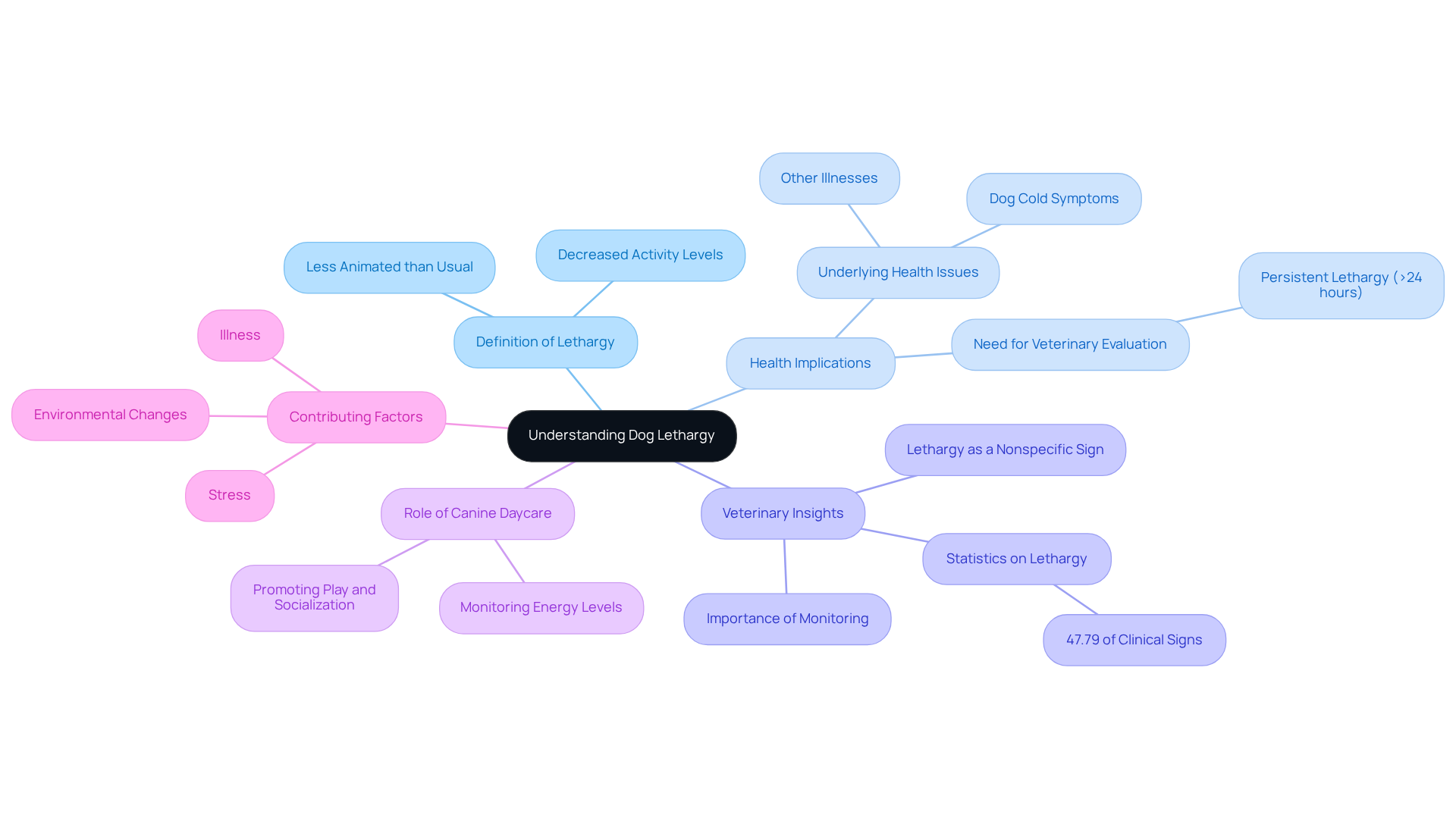
Sneezing: A Common Symptom of Canine Colds
As pet owners, we often worry about our furry family members, especially when they exhibit unusual behaviors like sneezing. This common action in dogs can stem from various factors, such as allergies, irritants, or even respiratory infections. When sneezing is accompanied by other dog cold symptoms, such as coughing or nasal discharge, it can indicate that your beloved pet might be feeling under the weather.
It’s important to keep a close eye on the frequency of your dog’s sneezing and any related dog cold symptoms. By doing so, you can better assess whether veterinary care is necessary. Remember, your observations are vital in ensuring your pet receives the nurturing environment they deserve. If you notice concerning signs, don’t hesitate to reach out for professional advice—your dog’s health and happiness are worth it.
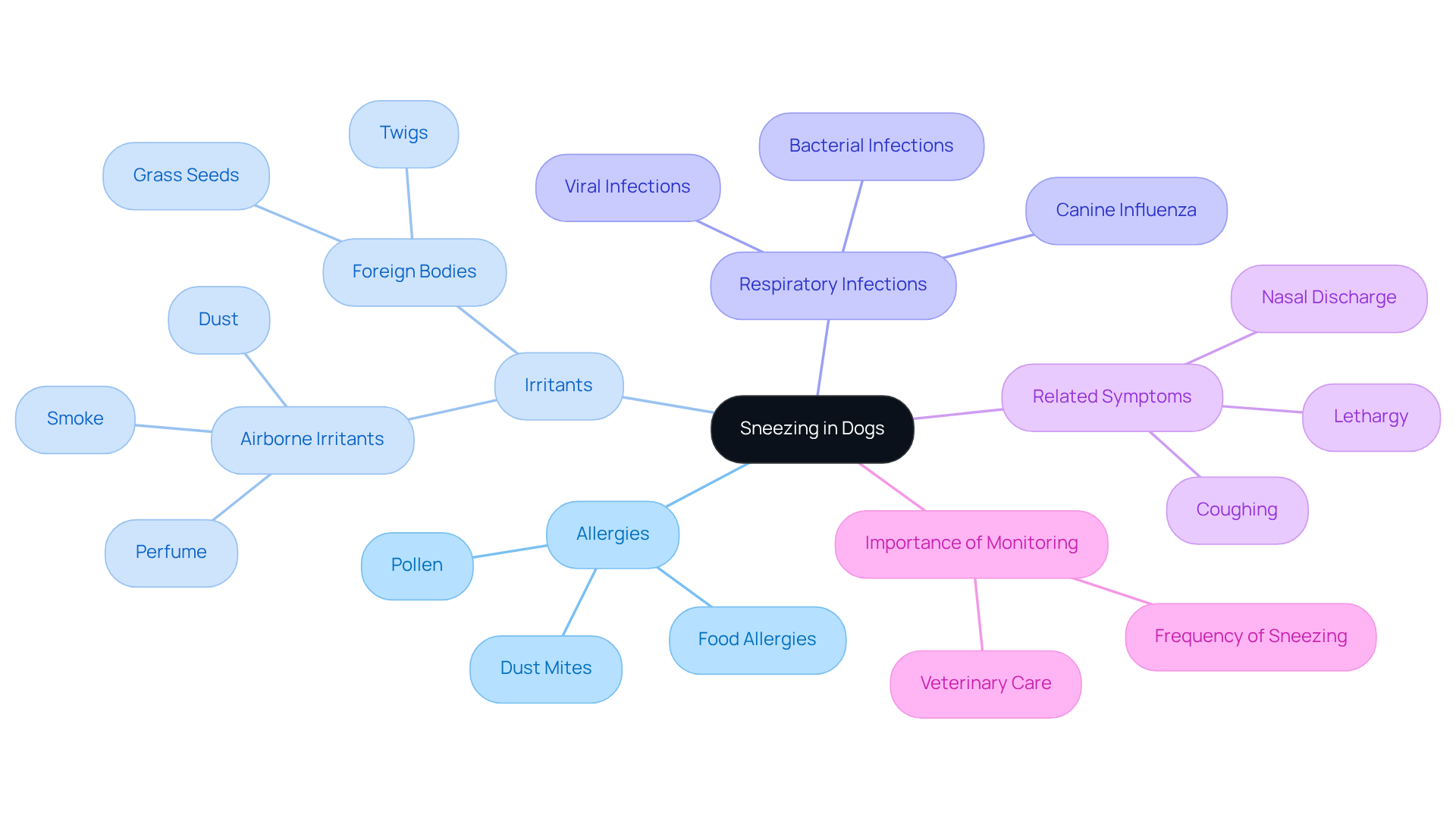
Loss of Appetite: A Warning Sign for Dog Owners
A sudden decrease in appetite in your furry family members can serve as a crucial warning sign, especially when it is accompanied by other indicators like coughing, lethargy, or even dog cold symptoms. If your dog refuses to eat for more than a day or shows a marked disinterest in food, it is essential to consult a veterinarian promptly. Understanding your dog’s typical eating habits is vital for recognizing when something may be amiss.
Veterinary insights reveal that appetite loss can be linked to various medical concerns. Studies show that approximately 96% of hospitalized canines do not meet their estimated energy needs, highlighting a significant risk of undernutrition. In fact, only 3.4% of canines managed to meet their energy requirements, underscoring the seriousness of the issue. Inappetence can manifest in different ways, including genuine inappetence, where dogs simply refuse to eat, and pseudo-inappetence, where they are unable to eat due to oral health problems.
If your dog stops eating, consider these steps:
- Monitor for additional symptoms such as vomiting, diarrhea, or lethargy, which may indicate a more serious condition.
- Ensure that the food is fresh and appealing; sometimes, pets may turn away from stale or unpalatable options.
Consult your veterinarian if the loss of appetite persists for over 24 hours, particularly in puppies or dogs with pre-existing health conditions.
Canine daycare centers often provide a nurturing environment for pets experiencing appetite loss, helping to reduce stress and encourage eating. They may offer specialized diets or appetite stimulants, such as ghrelin receptor agonists like capromorelin, under veterinary guidance to ensure that canines maintain adequate nutrition during their stay.
Veterinarians emphasize that changes in appetite should be viewed as a medical issue rather than a mere behavioral concern. As Laura Gaylord, DVM, DACVIM (Nutrition), wisely states, “picky eating or inappetence is a medical problem, not a nutritional problem.” Identifying the underlying cause of inappetence is crucial for determining appropriate treatments, which may include medications or dietary adjustments. Prolonged absence of food can lead to damaging effects on the gastrointestinal tract and organs. By addressing these issues swiftly, pet owners can play a vital role in protecting their pets’ health and well-being.
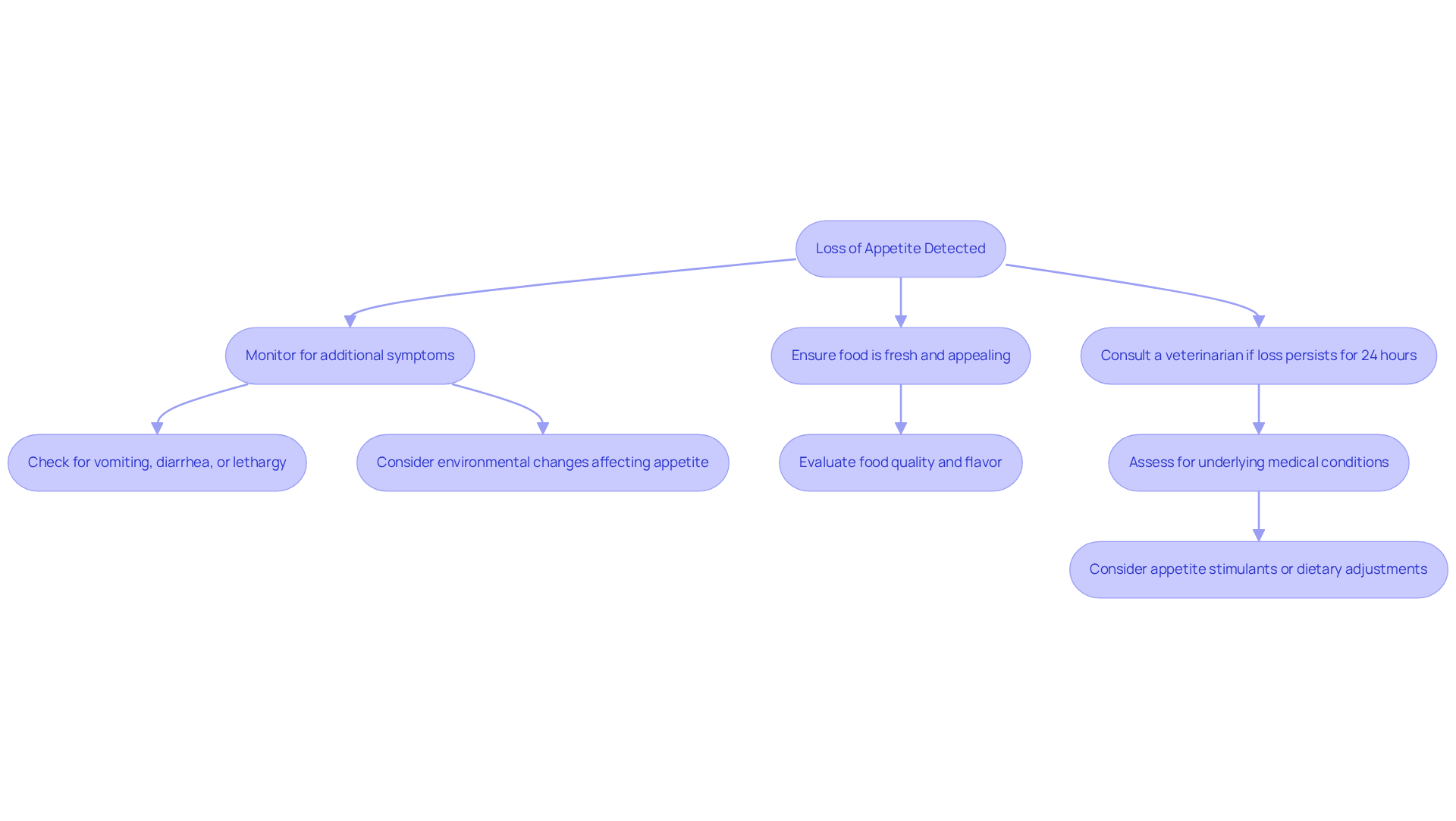
Fever: Recognizing Elevated Temperatures in Dogs
As a loving pet owner, it’s important to be aware that a fever in dogs is generally recognized as a body temperature exceeding 103°F (39.4°C), with a fever typically defined as greater than 102.5°F. To accurately check your furry family member’s temperature, a rectal thermometer specifically designed for pets should be used, inserted about one inch into the rectum.
Common signs of fever in dogs can include dog cold symptoms such as:
- Shivering
- Warm ears
- Lethargy
- A noticeable decrease in appetite
- Increased heart and breathing rates
- Vomiting
- Diarrhea
- Panting
If you suspect your dog has a fever, especially if it is accompanied by symptoms such as coughing or vomiting, it is crucial to consult a veterinarian promptly. Remember, a temperature above 104.5°F is considered an emergency, necessitating immediate veterinary attention.
At Adventure Den, we understand how vital it is to check your dog’s temperature for early identification of possible medical concerns. Our nurturing environment ensures that pets are closely watched for any indications of sickness during their visit, giving you peace of mind while your beloved companion is in our care.
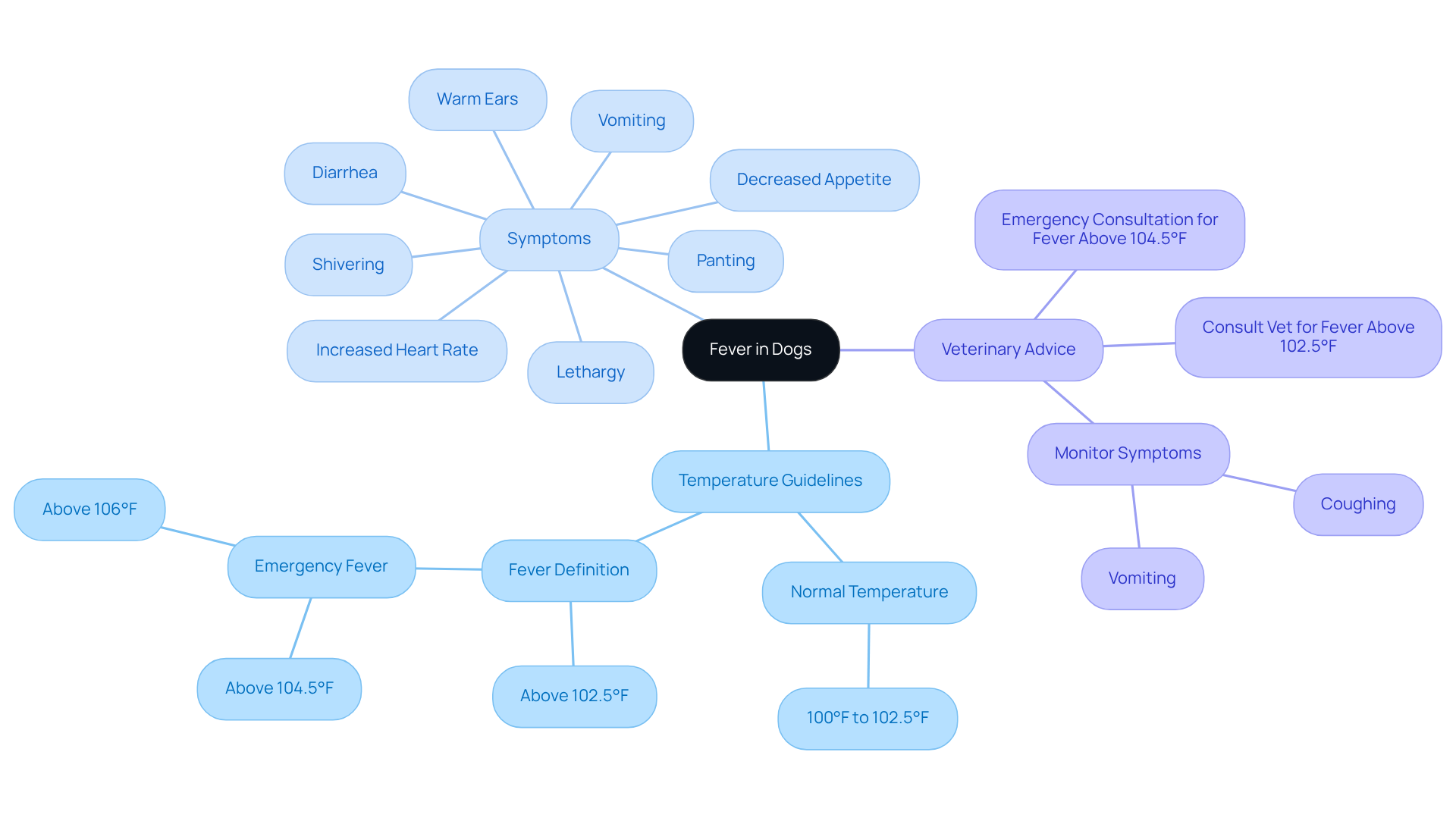
Dehydration: Monitoring Your Dog’s Fluid Intake
Dehydration is a significant concern for our furry family members, especially when they are unwell. It can occur when dogs do not intake sufficient water, leading to serious medical problems. Common signs of dehydration include:
- Dry or sticky gums
- Lethargy
- Loss of skin elasticity
- Increased heart rate
To combat this, pet owners must ensure their pets have constant access to fresh water and actively encourage them to drink, especially if they exhibit dog cold symptoms.
Veterinary professionals recommend closely monitoring fluid intake, as even mild dehydration can impact a dog’s overall health and recovery. As Jenny Feniak notes, if a dog is dehydrated but healthy, they can often bounce back in less than an hour with proper hydration. At dog daycare facilities like Adventure Den, dedicated staff members are trained to recognize signs of dehydration, ensuring that all dogs, especially those feeling under the weather, stay hydrated.
Preventative measures can make a world of difference. Consider:
- Offering nutrient-enriched water
- Incorporating wet food into their diet
- Flavoring water with low or no sodium broth
- Providing raw fruits and vegetables to encourage drinking
If dehydration is suspected, seeking veterinary care promptly is crucial to prevent further complications.
Remember, a dog requires at least one ounce of water for every pound of body weight daily. This makes it essential for pet caregivers to monitor their dog’s fluid consumption carefully, ensuring a nurturing environment for their beloved companions.
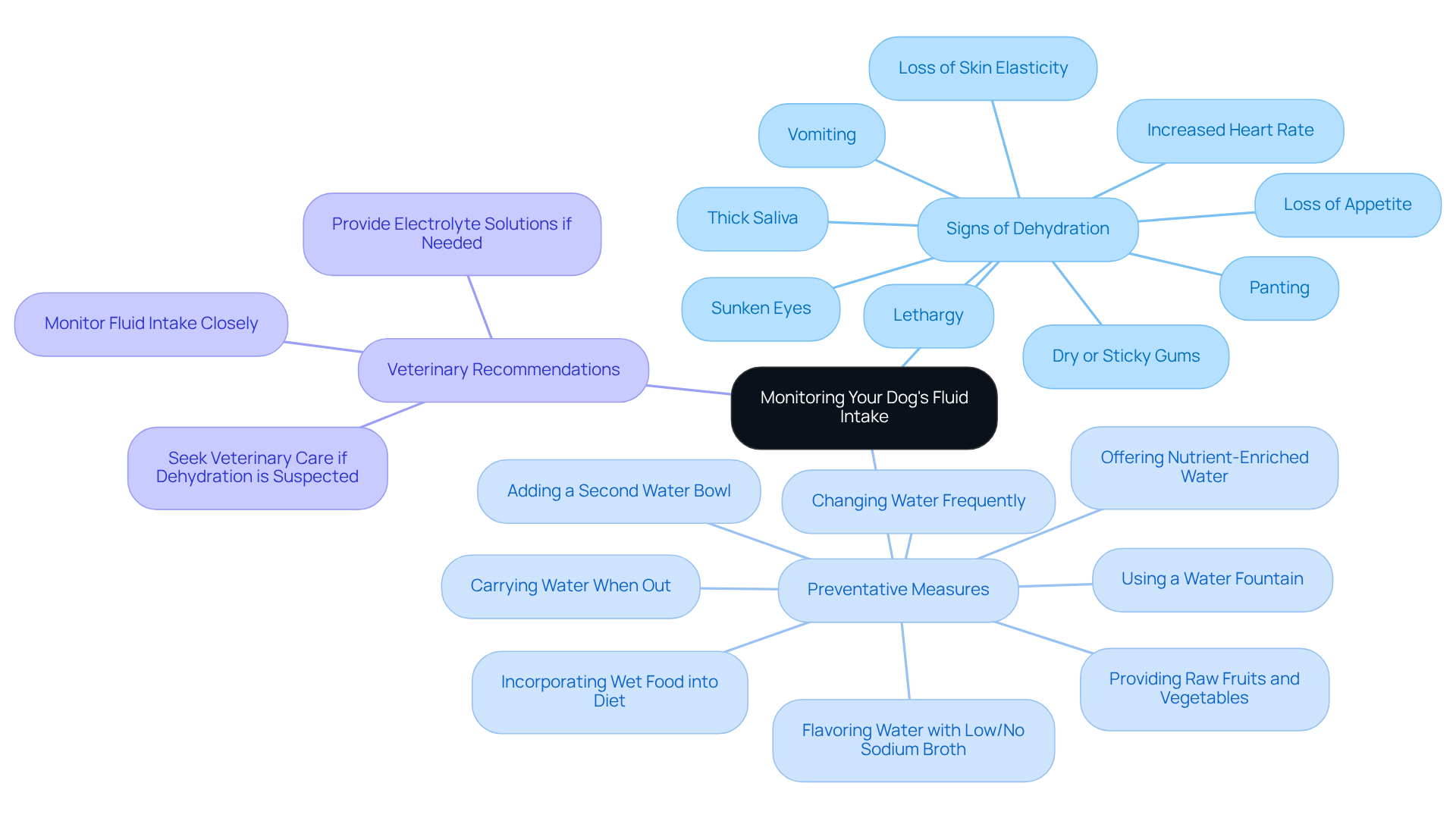
Veterinary Care: When to Consult a Professional for Your Dog
As a devoted pet owner, it’s crucial to remain vigilant. If your dog shows severe signs like:
- Persistent coughing
- Difficulty breathing
- High fever
- Prolonged lethargy
which are all dog cold symptoms, it’s time to consult a veterinarian. These symptoms can signal serious health concerns that need immediate attention. If your dog’s cold symptoms don’t improve within a few days, seeking professional advice becomes essential.
Early intervention is vital. Studies indicate that timely veterinary care can significantly enhance outcomes and prevent complications. For example, dogs experiencing respiratory distress or prolonged illness face a higher risk of developing more severe conditions without prompt treatment. By recognizing the dog cold symptoms and acting quickly, you can ensure your furry family members receive the best possible care. Remember, your proactive steps can make all the difference in their health and happiness.
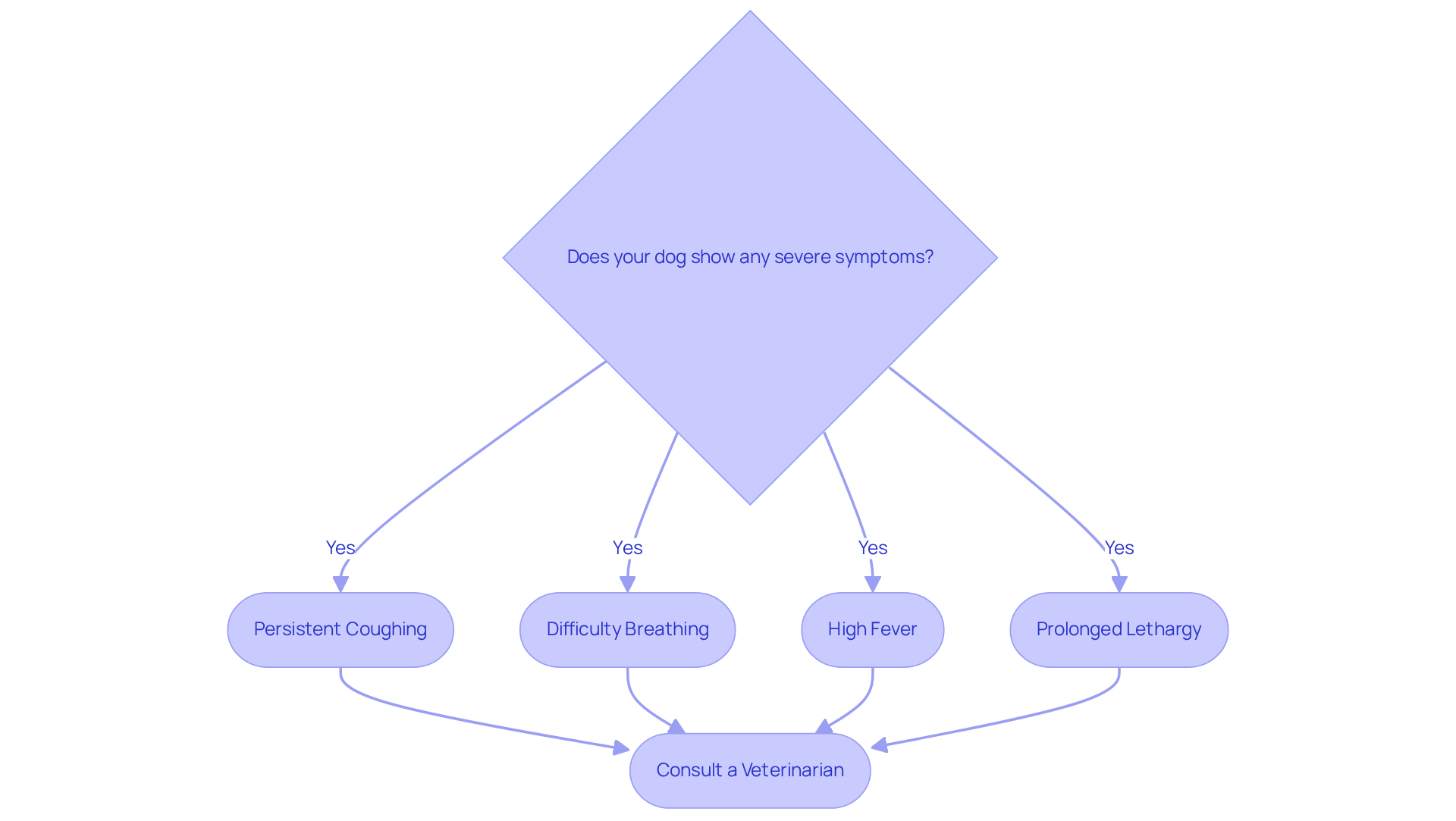
Prevention: Strategies to Keep Your Dog Healthy and Cold-Free
To effectively prevent colds in your furry family members, it’s essential for pet caregivers to keep their pets current on vaccinations—this is a fundamental aspect of canine health. Vaccinations protect against various infectious diseases, significantly reducing the risk of respiratory infections. However, it’s concerning that vaccination rates for canines have dropped from 76.58% in 2016 to 69.04% in 2022. This highlights the necessity of sustaining a minimum of a 70% vaccination rate to avert rabies outbreaks.
A balanced diet and regular exercise are also vital for maintaining a strong immune system. Imagine the joy of seeing your dog thrive with the right nutrition and activity! Furthermore, minimizing exposure to sick animals and practicing good hygiene can greatly decrease the likelihood of respiratory illnesses. Ensuring that your dog’s living environment is clean and comfortable, especially during colder months, contributes to their overall well-being.
By implementing these strategies and consulting with your veterinarian about vaccination schedules, you can help safeguard your dogs against dog cold symptoms and promote a healthier, happier life. Your commitment to their health makes all the difference in creating a nurturing environment for your beloved pets.
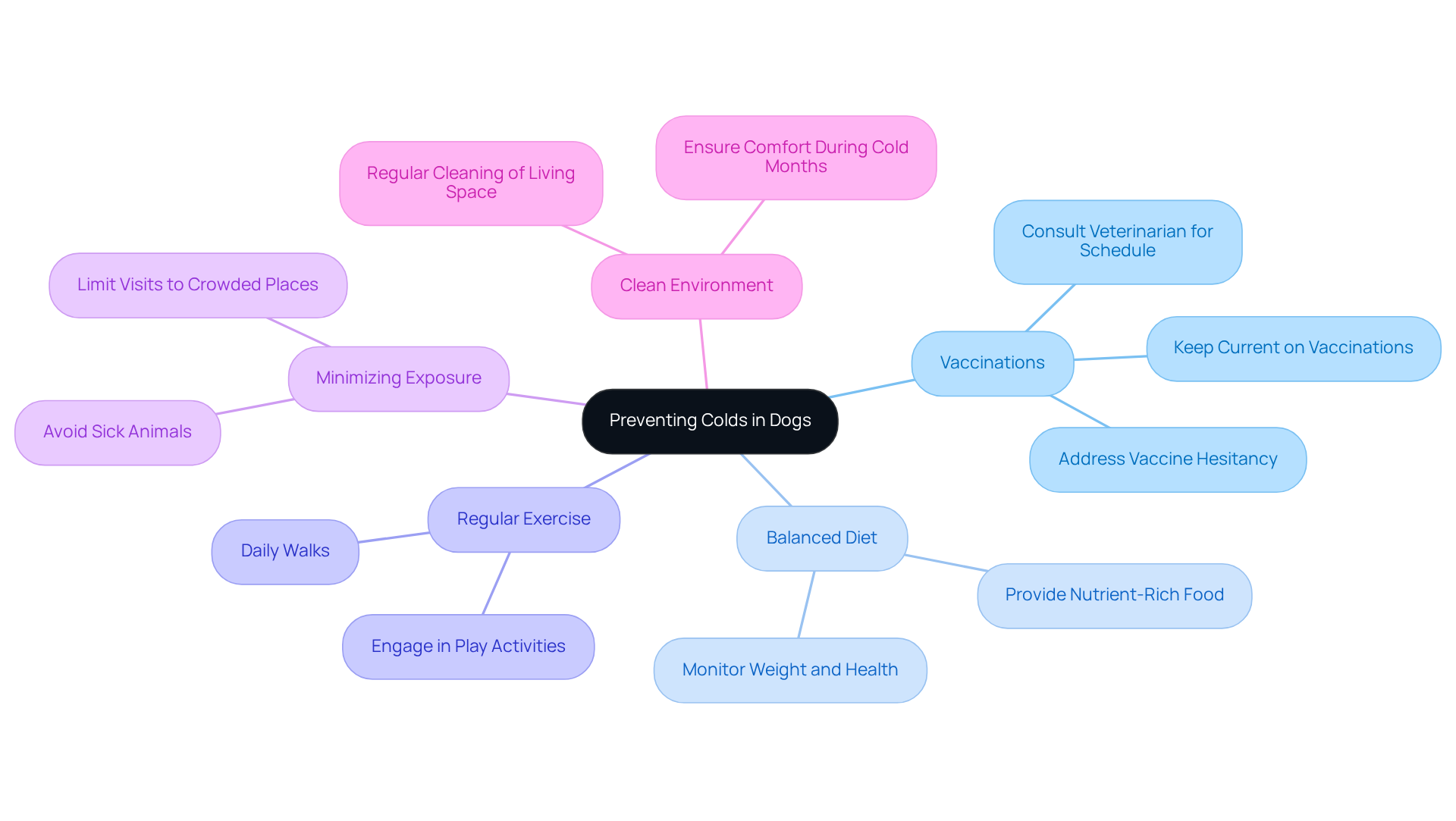
Conclusion
Recognizing and addressing dog cold symptoms is essential for every pet owner dedicated to the well-being of their furry family members. By understanding signs such as coughing, sneezing, lethargy, and loss of appetite, you can intervene promptly, significantly impacting your dog’s recovery. Being observant and proactive ensures that your beloved companions receive the necessary care and attention when they are feeling unwell.
This article has discussed key symptoms of canine colds, emphasizing the importance of monitoring behaviors and physical signs. A persistent cough, a runny nose, or lethargy—each symptom serves as a critical indicator of your dog’s health. Furthermore, we have highlighted the role of preventative measures, such as vaccinations and proper hydration, in maintaining your dog’s overall health and minimizing the risk of respiratory illnesses.
Ultimately, the responsibility lies with you, the pet owner, to create a nurturing environment that promotes your dogs’ health and happiness. By staying informed and vigilant, and seeking veterinary care when necessary, you can make a substantial difference in your pets’ lives. Embracing these practices not only enhances the well-being of dogs but also strengthens the bond between pets and their owners, ensuring a happier, healthier life for your cherished companions.
Frequently Asked Questions
What is Adventure Den’s approach to caring for dogs with cold symptoms?
Adventure Den provides personalized care plans tailored to the unique needs of dogs showing signs of illness, ensuring they receive the attention and comfort necessary for recovery in a nurturing environment.
What are common symptoms of a dog cold that owners should look out for?
Common symptoms of a dog cold include coughing, sneezing, and lethargy. Prompt detection of these symptoms is crucial for the health of the dog.
How does Adventure Den monitor dogs for cold symptoms?
The staff at Adventure Den is trained to monitor dogs closely for symptoms such as coughing and sneezing, ensuring any changes in a dog’s condition are swiftly addressed.
Why is coughing significant in dogs?
Coughing can indicate irritation in the throat or respiratory tract and may signal dog cold symptoms or other respiratory conditions. The frequency and intensity of the cough should be monitored for any changes that may require veterinary attention.
What should pet owners do if their dog has a persistent cough?
Pet owners should closely monitor the cough’s frequency and intensity and seek veterinary attention if the severity increases, especially if the cough occurs at rest rather than during play.
How does kennel cough relate to dog cold symptoms?
Kennel cough is a common respiratory infection in dogs that often presents with coughing as a key symptom. It can be particularly prevalent in communal environments like shelters or daycare facilities.
What preventive measures can be taken to protect dogs from kennel cough?
Annual vaccinations are advised to help prevent kennel cough, providing significant protection for dogs in communal settings.
What should owners do if their dog has a runny nose?
Owners should monitor the nature of the nasal discharge; a mild runny nose may not be concerning, but persistent or discolored discharge could indicate a more serious issue and should be evaluated.
How can pet owners ensure their dogs receive the best care at Adventure Den?
By being vigilant and observing their dog’s behavior and symptoms, pet owners can communicate any concerns to the staff at Adventure Den, who are dedicated to providing a nurturing environment for recovery.







